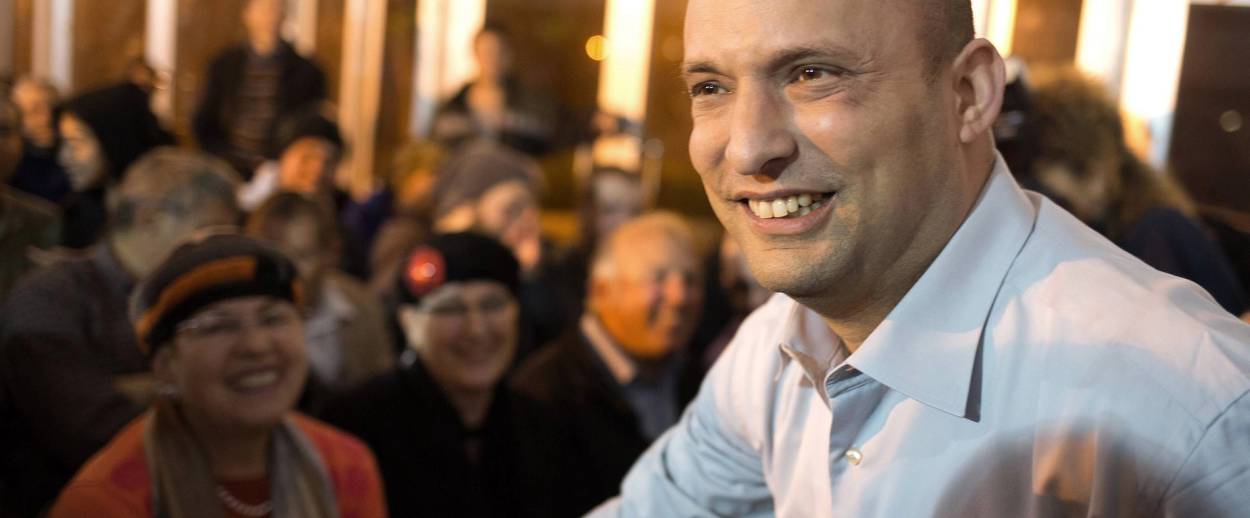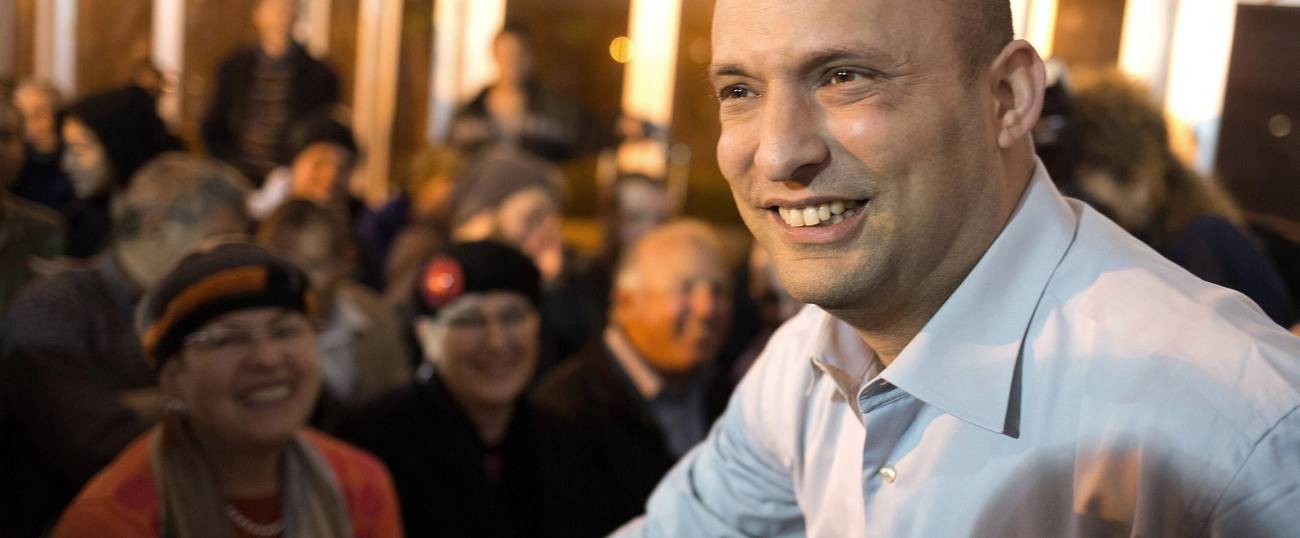Naftali Bennett Makes a Stand
Israel’s defense minister showed politicians everywhere how to respond to racism in their ranks




Three elections within 11 months, indictment of a sitting prime minister, skirmishes with jihadists in Gaza, potential war with Iran, record rainfall, and incendiary balloons: Events in Israel have been even more dizzying than those in the United States. If you blinked, you might have missed a rare moment of moral clarity.
It came, of all places, from Naftali Bennett, Israel’s current defense minister and leader of the small New Right party. He isn’t a household name in the United States, but in Israel he’s well known for his slick appearance—he comes out of high-tech—and his hawkish views, which consistently skew to the right of Benjamin Netanyahu’s ruling Likud party.
In recent weeks, satellite parties on both left and right have come under pressure to merge and maximize the strength of their respective blocs. Lists that fail to attract more than 3.25% of the electorate do not enter the Knesset, meaning thousands of votes could effectively be voided. Left-wing Meretz, which came dangerously close to that threshold in the last election, has joined with Labor-Gesher for the upcoming March elections. On the right, Bennett was negotiating with the religious-Zionist Jewish Home party. The rub was that Jewish Home had already partnered with Jewish Power, an extremist faction run by disciples of the late Rabbi Meir Kahane, one of the founders of the U.S.-based Jewish Defense League who went on to found a political party in Israel that was later banned from the Knesset. Jewish Power contested both of 2019’s elections and, much to the relief of everyone, failed to attract enough support to enter the Knesset. Everyone except Prime Minister Benjamin Netanyahu, who rued “wasting” votes—no matter how racist the views of those casting the votes—that might bolster his right-wing bloc.
Bennett faces a quandary, which may sound familiar to some Republican members of Congress, in that he neither likes nor trusts Netanyahu but views him as necessary toward furthering his political ambitions and agenda. Netanyahu, true to past form, awarded Bennett the defense ministry months ago to secure his loyalty, then threatened to oust him from the post if he didn’t link up with Jewish Power.
But rather than folding and whitewashing Israel’s homegrown fascist party, Bennett did the opposite. He not only refused to bring in Jewish Power, he took to his Hebrew-language Facebook page last week to explain why:
As chairman of the New Right party that is running for the Knesset, and as the former education minister for the State of Israel, I cannot include in my list someone who hangs on the wall of his living room a picture of a man [Baruch Goldstein] who killed 29 innocent people.
This is so obvious that I’m dumbfounded that I have to explain it at all.
Imagine an American Congressman who had hanging on the wall of their home a picture of someone who killed dozens of Jews praying in a synagogue. Would that make sense to you?….
We did not return from Diaspora to the Land of Israel in order to live like wild militias who carry out their own justice.
As Bennett noted, nothing in the statement is novel or controversial. It merely reiterates norms accepted by practically every Israeli. Yet that’s precisely what makes his stance extraordinary and urgently needed. Societal norms are preserved only if people actively reinforce them (something Jews have managed for 3,000 years by carrying out daily mitzvot). We live in an era when right-wing politicians in Israel and the United States alike have cynically blurred the lines between acceptable discourse and racist incitement. Bennett’s rejection of extremism—so much clearer than President Donald Trump’s robotic disavowals or Netanyahu’s English-language sops to American Jews—remind us there are red lines no one should cross, no matter your place in the political spectrum.
Bennett’s words should be read from the bimot of American synagogues. On a depressingly regular basis, I hear friends on Facebook and at Shabbat tables blithely spouting neo-Kahanist ideas: scorn for universal rights, a tendency to regard tikkun olam and empathy toward the other—bedrocks of Jewish theology—as assimilationist claptrap. Bennett reminds us that even from a rightist, pro-settlement perspective, such sentiments are neither Zionist nor Jewish. “That’s not right wing. That’s anarchy,” he said.
Those on the left, meanwhile, should give Bennett the courtesy of taking his words at face value—as a moral stand by a man who may be acting in accordance with his political self-interest but has still done something fundamentally admirable. Bennett has, of course, also done plenty that reasonable people find objectionable. In the days following his statement, he ordered the army to bar some left-wing activists from the West Bank and advocated extending Israeli sovereignty to Palestinian territories. But left-wing voices like former Meretz leader Zehava Galon make a grave error when they insist there is no difference between Bennett and the Kahanists. Such shows of moral purity may be tempting, but to paint all right-wingers with a broad brush risks losing sight of the real threats facing democracy.
***
Like this article? Sign up for our Daily Digest to get Tablet magazine’s new content in your inbox each morning.
David Zenlea is a Detroit-based editor with a degree in Jewish Studies from the University of Maryland. He’s written for Detroit Jewish News, Road & Track, Washingtonian magazine, and others.